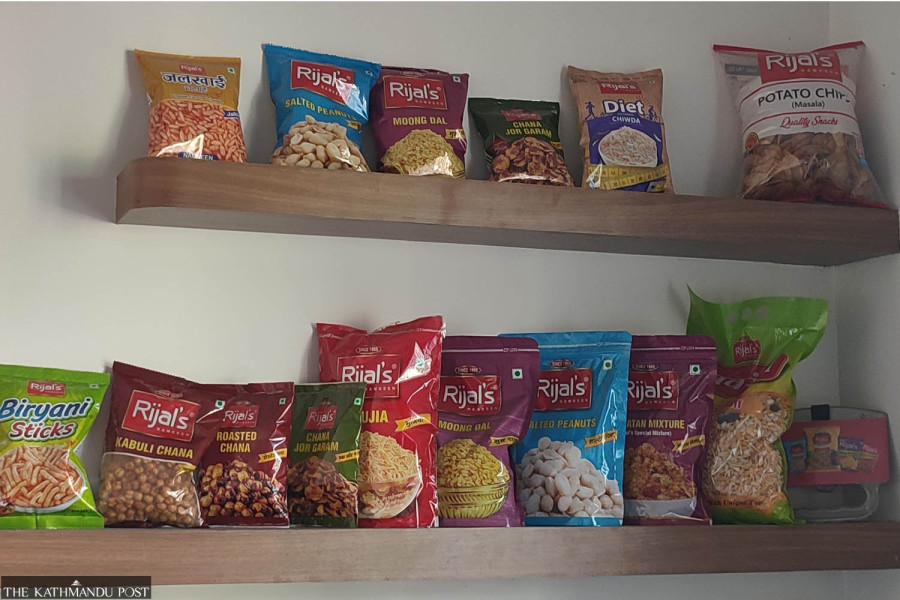Money
Rijal’s dalmoth: A growth story
The snacks company has an annual transaction of Rs450 million, with production stretchable to Rs1 billion.
Ramesh Kumar Paudel
Rajendra Prasad Rijal started selling dalmoth (savoury snack) nearly four decades ago with an initial capital of Rs6,000.
His business expanded, and now the products are available nationally and internationally.
The ‘Rijal’ brand of dalmoth is very well known. The company makes Rs450 million in transactions annually and has a Rs1 billion worth of production capacity in case of high demand.
Rijal opened his own company after having worked in a dalmoth factory.
“My uncle Tej Kumar opened a dalmoth factory at Urlabari, in eastern Nepal, in 1980,” said Rijal. He worked there in 1982.
To sell the dalmoth produced at his uncle’s factory, Rijal travelled to many places around the country.
While visiting Chitwan for sales, he saw the possibility of producing and selling dalmoth independently. In 1987, Rijal started the groundwork.
In December 1987, he started production at his son-in-law’s house by frying it in a pan.
Initially, the son-in-law helped Rijal. After a year, his brothers, too, joined him.
Rijal then started to expand the business. “I learned the craft from production to sales and keeping accounts while working with my uncle. I had built a good network in the market. The skills I learned gave me confidence to start my own production,” he said.
He visited Chitwan to Butwal and Tanahun to Bimalnagar to sell dalmoth.
“My brother saw the potential every time he came to Chitwan from the eastern region to sell dalmoth. The bridge on the Narayani river had just been constructed. Narayangadh-Muglin road was being operated. All this gave him the thought of expanding the business from here,” said Purushottam Rijal, Rajendra's brother.
At that time, raw materials of dalmoth could be brought on credit while the finished product sold in cash.
Initially, Rijal introduced his products under the brand name ‘Shantkamal’. After six years, in 1993, he registered his firm as ‘Rijal Foods’ and started production. To give the firm a corporate structure, he renamed the company Rijal Food and Beverage Private Limited in 2015. That year, he bought 22 kattha land at Belshi, Ratnanagar municipality.
There is a production plant on ten katthas. The remaining land is being used for storage.
The factory currently produces 25 types of snacks, including bhujiya, chips, and furandana. The company sells snacks in 10-gram packages to 800-gram packages.
“Our products reached across the country. We have 190 dealers from Taplejung in the east to Darchula in the west,” said Purushottam, the managing director.
He said that the company's popular products are dalmoth, bhujiya, and chips. Made with whole dry chillies, peanuts, pieces of ginger, and curry leaves on beaten rice, furandana from Rijal Foods is consumed mostly by field and office workers.
Consumers are attracted to products by their quality and packaging. Considering this, the company has adopted advanced techniques of production and packaging, said Purushottam.
Rapid urbanisation has made shopping malls and department stores ubiquitous. Indian dalmoth and bhujiya brands are highly visible in these shopping centres.
Nepali dalmoth used to be produced in a small area. The packaging was poor, and the marketing was not aggressive.
“We were enrolled in the VAT system in 1997. This benefited us in getting support from a project in Denmark to produce unadulterated and qualitative products. For three months, they guided us,” Purushottam said.
“The project helped us learn efficient fuel-saving methods, which helped increase productivity, packaging and marketing.”
Rijal brothers often visited Rajasthan, India, mainly to observe various dalmoth and bhujiya factories. They even attended dalmoth and bhujiya-related fairs in India.
This helped the Rijals learn about the equipment and technology used in similar factories.
In 2011, Purushottam started using new technology for dalmoth production. Purushottam said that snacks like dalmoth, bhujiya, and Rijal chips have a 22 percent share of the Nepali market.
Rijal's snack products have reached countries such as Italy, Belgium, Portugal, Malta, Germany, France, Australia and Japan, among others.
Rajendra’s sons Swarup and Saurabh also produce pickles, ketchup, and sauce under the Rijal brand.




 10.12°C Kathmandu
10.12°C Kathmandu1.jpg)














